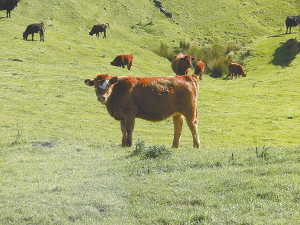Waikato sharemilker launches ‘Tinder for cows’ using AI and breeding data
Waikato sharemilker Matthew Zonderop had no inkling that one day he would become a matchmaker for cows.
 Simmental is a cattle breed that is ticking farmers’ commercial boxes and boosting their bottom lines.
Simmental is a cattle breed that is ticking farmers’ commercial boxes and boosting their bottom lines.
In beef progeny trials by Beef + Lamb NZ across NZ, initial weight-based results show Simmental are performing at the top of the breeds.
The latest test results, from a 2018 trial, were again compelling, said BLNZ Genetics general manager Graham Alder.
It showed superior growth rates for the Simmental breed versus Angus, Hereford and Charolais.
“It confirmed what was suspected with regard to estimated breeding values (EBVs): they work. They deliver what they predict.
“Simmental bulls produced progeny with a 6kg higher average weaning weight and 20kg higher yearling weight.”
Adler says the actual yearling weights for Simmental were 310 - 340kg versus 285 - 315kg for Angus and 280 - 310kg for Hereford.
The Simmental breed originates from Switzerland and was introduced into NZ farms in 1971, with the first calves born a year later.
Richard Scholefield heads up Whangara Farms on the North Island’s east coast -- a Maori-owned farming operation. Across its 8500ha Schofield and his team run 75,000 stock units including 2500 breeding cows.
Of that number, 1000 are put to Simmental bulls, a breed Schofield says is contributing to the commercial success of the business.
“A big driver for us, initially, was the focus on growth rate as we wanted to move from a three-year finishing policy to an 18-month system,” he explains.
“We needed fast-growing animals and Simmentals provided that. For the past decade, we’ve seen them hitting the targets we need them to hit. It’s been working well.”
Schofield says an interesting development – as the testing covered the spectrum of terminal sire breeds – is that Simmentals have “an undeniable hybrid vigour and have proven to grow faster”.
He sources his Simmental bulls from Jon Knauf at Kerrah, but was introduced to them by Daniel Absolom at Rissington.
“Daniel is a driving force behind Simmental and is a great advocate of the breed. Jon Knauf is also very passionate about Simmental and is very progressive.
“I think it’s important to choose your breeder wisely and make sure you have the same objectives,” Schofield says.
“Genetics is one area farmers can have 100% control over.
“The bull decision you make will affect your herd performance and profitability for at least the next 8-10 years. Simmental are an important component in our farming system and their outstanding growth rate and returns make commercial sense for our business.”
Grace Su, a recent optometry graduate from the University of Auckland, is moving to Tauranga to start work in a practice where she worked while participating in the university's Rural Health Interprofessional Programme (RHIP).
Two farmers and two farming companies were recently convicted and fined a total of $108,000 for environmental offending.
According to Ravensdown's most recent Market Outlook report, a combination of geopolitical movements and volatile market responses are impacting the global fertiliser landscape.
Environment Canterbury, alongside industry partners and a group of farmers, is encouraging farmers to consider composting as an environmentally friendly alternative to offal pits.
A New Zealand dairy industry leader believes the free trade deal announced with India delivers wins for the sector.
The Coalition Government will need the support of at least one opposition party to ratify the free trade deal with India.

OPINION: The release of the Natural Environment Bill and Planning Bill to replace the Resource Management Act is a red-letter day…
OPINION: Federated Farmers has launched a new campaign, swapping ‘The Twelve Days of Christmas’ for ‘The Twelve Pests of Christmas’ to…